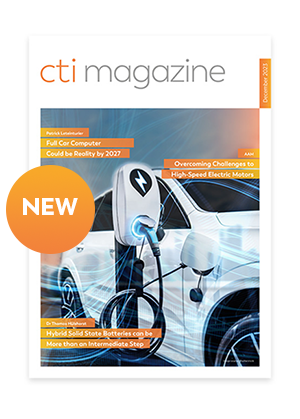Mobility for tomorrow – an integrated view on the energy and powertrain options
Interview with Prof. Dr Peter Gutzmer, Chief Technology Officer, Deputy CEO, Schaeffler AG
The transmission world is in a phase of change. In addition to improving the classic transmission technology, new technologies have to be integrated into new types of transmissions. We spoke to Prof. Dr Peter Gutzmer, Deputy CEO of Schaeffler AG, in Berlin.
CTI: The CTI Symposium 2017 has a slightly different feel than in previous years. That was clear in your lecture and the subsequent discussion too. The industry isn’t just discussing mechanics or mechatronics any more – it goes much further. Does that feel good for an engineer?
Prof. Dr Peter Gutzmer: This is the change that lies ahead. We are experiencing really significant changes. People are discussing drive electrification, autonomous driving, connected driving, and we need to examine all these issues. What’s becoming clear is that functionality plays a key role; we need to ‘think’ user functionality into the product. So in a world of political and social change, our deliberately holistic, joined-up thinking is absolutely right. We want to address the technological change people are talking about here. We want to make them more aware, to build on that more. It starts in your apprenticeship or at school, and ends in your job or career and the responsibility you assume there. Holistic thinking, systemic thinking, optimizing functionality in everything you do … ultimately, that plays a very big role in the components you produce. That’s what we tried to convey.
CTI: That’s not standard practice for automotive suppliers. Not everyone is doing it yet, although Schaeffler certainly are. How do OEMs react when you negotiate or consult?
Peter Gutzmer: So far the results have always been positive. The change involves building competence at system level so you can discuss projects on an equal footing, and speak the same language in terms of requirements. At the end of the day it’s not who does what better, or who knows something better – It’s about finding the optimum. The optimum means function, cost, weight … all those issues. And the more open you are with that, the more experience both sides bring to the table from a systemic viewpoint, the easier it is to come together. You still get turbulence, fierce debate or emotions … but it’s a different approach than just saying, “I want something. Your job is to deliver and if you can’t, I’ll go next door”. This is the future. The future is much more complex, we’ve seen it. The future is electric drives, connected to a new form of combustion engine, with a different form of transmission. Whether you call that dedicated hybrid or not doesn’t matter. For that to work, everyone needs to grow their experience in product design and product functionality, and bring that knowledge to the table.
CTI: So prospects are good for the industry?
Peter Gutzmer: I’m totally optimistic. We can do this. We have the problem, naturally, and we need to find the resources. We have to apply our knowledge to the complexity that lies ahead. From fuel cell to battery competence, we need to optimize electric drives, optimize combustion engines and optimize manual shifts. There’s a vast field opening up here, and we need to master it by providing resources in a sensible way. That’s going to be the real issue. As I’ve said, we need to think much more in terms of scenarios and portfolios. That goes for suppliers too; risk-wise, they should focus on specific core areas. It’s definitely going to change us. And I don’t just believe, I am absolutely certain that the company who does that best, who presents that best in a holistic way, will be the one who succeeds.
